Review for Oppenheimer
Introduction
I don’t like watching Oscar winning movies. It’s a wholly subjective opinion, but I feel as if they gain an aura of self-important pretentiousness as soon as they garner an award. I think it has something to do with my childhood, when Oscar winners all seemed to be films with a message. That and the fact that the films that I enjoy the most never seemed to win one of the meaningful Oscars; apart from those rare years when the Academy would thrown the geek a bone, and give it to Lord of the Rings. The solution then is to watch the films before the Oscars, which is why I sit here now opining about Oppenheimer, instead of in a few weeks.
On top of that, I’ve been in two minds about this Oppenheimer movie from Christopher Nolan, a director who to me has been wavering between pretention and auteur for a few movies now. He has a thing about shooting on film instead of digital, which I can get behind, loves fractured narratives, but can bury dialogue in a sound mix, which annoyed me no end with Tenet, perhaps my least favourite Nolan movie. And the question arose whether the world needs another J. Robert Oppenheimer biopic. One of my favourite films is Shadow Makers, a.k.a. Fat Man and Little Boy, a 1989 movie starring Dwight Shultz and Paul Newman, which admittedly focuses on the story of The Manhattan Project, with perhaps a tad too much dramatic licence. But then again last year as the hype for this film was intensifying, the BBC took the opportunity to repeat their 7-part drama from 1980, also called Oppenheimer starring Sam Waterston, which does a more thorough job of covering the physicist’s life.
J. Robert Oppenheimer was the right man at the right time, with Einstein’s theory of relativity opening a whole new world of physics, made all the more inspiring by the new realm of the Quantum. It was also a time of global political upheaval, with Empires falling, and the new paradigms of democracy, communism, and fascism competing for people’s hearts, engendering conflicts the world over. When those conflicts erupted into the global conflagration of the Second World War, past political affiliations took a back seat to national imperative, and Oppenheimer became tasked with creating a new weapon to end the war, perhaps end all wars once and for all. But once the dust settled, Oppenheimer’s politics came back to haunt him.
The Disc
Shot for IMAX, multiple aspect ratios, 65mm film invented specifically for this movie, in both colour and black and white. Yes, it is a Christopher Nolan movie. So you get a film on this disc that switches between colour and monochrome, in 2.20:1 and 1.78:1 widescreen 1080p format, with DTS-HD MA 5.1 Surround English, and Dolby Digital 2.0 Stereo English Audio Descriptive with optional English subtitles (although when the dialogue gets lost beneath music or effects, the subtitles are less optional than necessary). It’s a fantastic transfer of a recent film, clear and sharp with excellent detail, rich and consistent colours, and deep contrast in the monochrome sections. The larger frame tends to be used for establishing scenery shots, while the wider scope is used for character moments (no doubt because of the noise of an IMAX camera versus the need to capture on set dialogue).
Extras
You get two discs in a thin BD Amaray eco-case with bits cut out of the plastic, with an o-card slipcover. The discs boot to animated menus and the feature disc has the film alone on it. The extras are all on disc 2.
The Story of Our Time: The Making of Oppenheimer (72:25)
Trailers x5 (14:11)
Innovations in Film: 65mm Black and White Film in Oppenheimer (8:21)
Meet the Press Q&A Panel: Oppenheimer (34:46)
To End All War: Oppenheimer & The Atomic Bomb (87:18)
Conclusion
To be frank, the history of the atomic bomb, and the life of J. Robert Oppenheimer is so well documented at this point, that if you’re initiated, then there is very little that is new in this latest biopic. But in the 35 years since the last film, whole generations have been born into the world for which this story will be brand new, and it’s certainly worth revisiting in cinematic form. Christopher Nolan’s Oppenheimer is a brilliantly made, engrossing and thought provoking vision of the father of the bomb, pretty much told from his perspective (except the monochrome scenes which tell Admiral Lewis Strauss’ story some years later).
Despite it being based on a comparatively recent book, The American Prometheus, this Oppenheimer tells much the same story as the BBC Oppenheimer drama. If I were being mean, I’d say that Nolan took that drama, cut it into little pieces and mixed it all up, and buried some of the dialogue under background noise, while accompanying most of the film with a ponderous orchestral score. The TV drama has a leisurely 7 hours to tell its story; this film has just 3, so events move at a more rapid pace, even with Nolan’s typically fractured narrative, jumping back and forth through Oppenheimer’s life.
The film gives us some background into the man, his passion for the new physics, his relationships, and the world that shaped his politics in directions that would eventually cause such headaches, giving his political opponents weapons to use against him. The film really focuses on three particular moments though; the years of the Manhattan Project from inception to the end of the war in Japan, the hearing in 1954 that denied Oppenheimer his security clearance, and the 1959 Senate confirmation hearing for Lewis Strauss which followed on from the 1954 hearing.
It’s certainly not as fanciful as Shadow Makers, but Oppenheimer does have its share of dramatic licence, with some interesting imagery to give a flavour of the kind of Quantum Physics that was being played with here. It’s also stylised enough to get the film censored in India, as well as nod a head at the conspiracy theories around Jean Tatlock. But it does a fine job in exploring the people involved in these events without overwhelming audiences with the technicalities behind the science. You don’t need to know how nuclear bombs work to enjoy this film.
Nolan also finds a through-line to hold the story together. All three of the stories I’ve seen about Oppenheimer make mention of the theory that was put forward during the Manhattan Project, that the first nuclear detonation would run out of control and ignite the atmosphere of the planet, destroying all life. In the earlier two versions, it was almost a passing comment, very much a throwaway curiosity. For Nolan, it’s at the heart of this Oppenheimer biopic, asking just what kind of man would take that risk, however minuscule. It’s a constant question, a percussive heartbeat through the film, leading to a jaw-dropping conclusion.
It almost seems petty to find a nit to pick with the film, but if there is a criticism, it’s that the actual nuclear explosion is a bit of a squib. Christopher Nolan made a big deal about shooting this film practically, and getting its visual effects in camera (you can see how they accomplished some of those spectacular subatomic visualisations in the extras), but when it comes to the Trinity test, this is one instance where surrendering to CGI might have been the better choice. A nuclear explosion is a gargantuan thing; the complex structure of the resultant mushroom cloud has a kind of fractal infinity to it. There’s plenty of actual footage out there of atmospheric tests from the fifties and sixties to show what nuclear bombs look like going off. They tried to replicate it here with conventional explosives and on camera the bomb looks exactly like what it is, a big gasoline explosion, but not as big as the bang they used in Spectre.
I am being petty. After all this film is about the man who made the bomb, not the bomb itself, and in that regard, Oppenheimer will no doubt clean up at the awards ceremonies, and deservedly so. The Blu-ray is of exceptional quality as you’d expect, although by this point the 4k would be preferable. The extras too are of a decent quality, and I really want to find the time to give the Oppenheimer documentary on disc 2 a more considered watch.
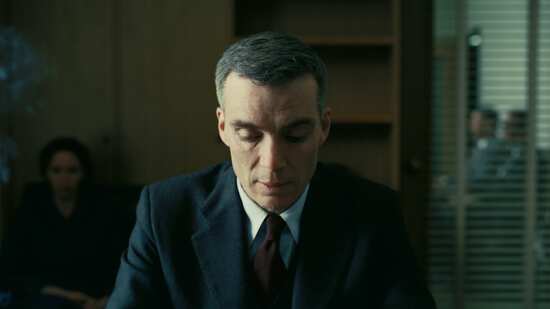
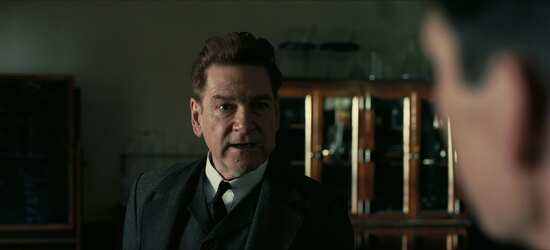
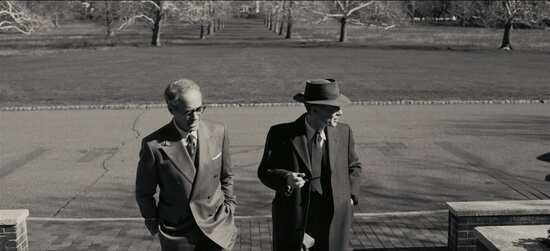

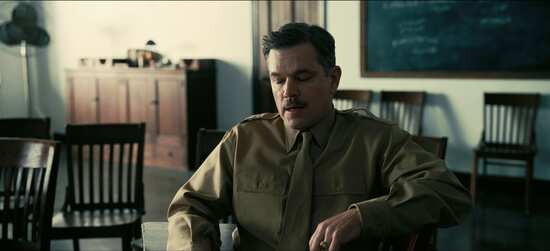



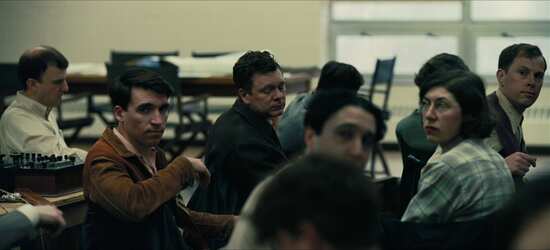
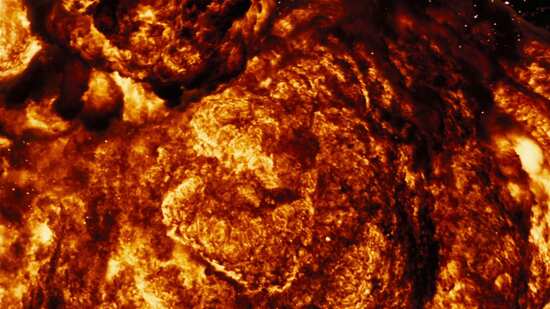

Your Opinions and Comments
Be the first to post a comment!